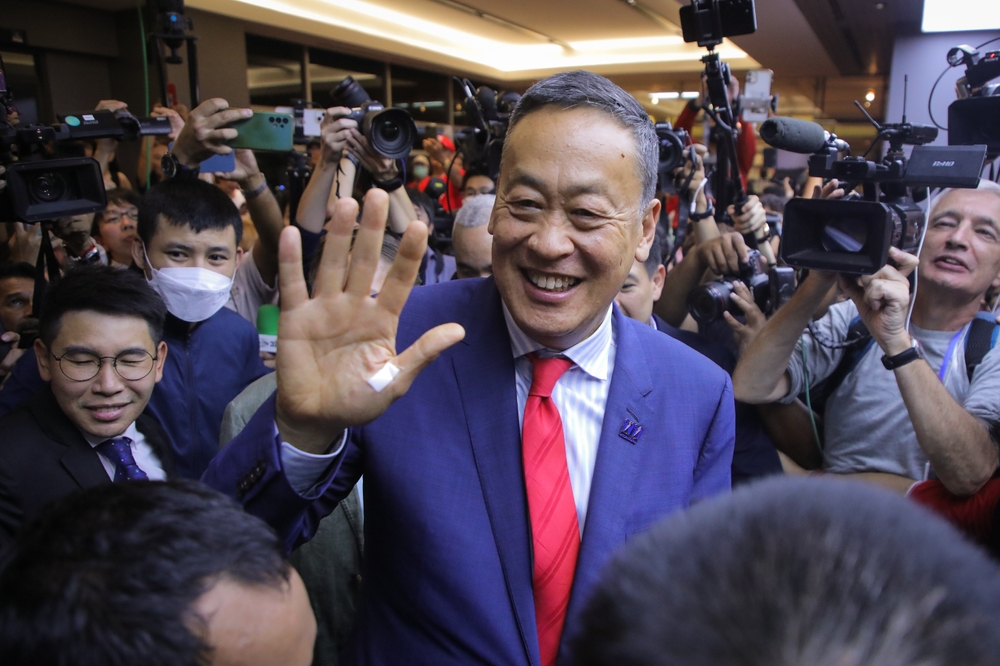Former Sansiri CEO assumes Thai Prime Ministership, focuses on real estate-led economic recovery
The new prime minister Srettha Thavisin is expected to pursue real-estate-friendly policies as he bids to regenerate the economy

It is said that a week is a long time in politics. This year, Thailand’s parliament stretched that adage to new extremes when it took more than three months to elect a new leader. And, even then, the eventual choice was not a candidate from the party that won the most votes and seats in May’s general election.
Following a lengthy political impasse, during which the heir apparent, Move Forward Party’s Pita Limjaroenrat, twice failed to secure the necessary parliamentary vote, Pheu Thai’s Srettha Thavisin was appointed Thailand’s 30th prime minister in August. He now leads a coalition government comprising 10 other parties.
Srettha, an unelected member of parliament who only entered politics a year ago, made his name and fortune in real estate. From a family with deep connections in the business elite, the 60-year-old billionaire started his career at the Thailand arm of multinational firm Procter & Gamble after studying for economics and management degrees in the United States.
In 1990, along with his cousins, he founded a company that went on to become property developer Sansiri, eventually growing it into one of Thailand’s largest real estate firms. Expectations are high, then, that Srettha, with his background, will tackle issues plaguing the country’s real estate sector.
“From a developer perspective, he already has a deep understanding of the market dynamics,” says analyst Marciano Birjmohun, citing industry volatilities such as ownership rights, overseas transactions, high-density city development challenges, and changes in consumer behaviour, amongst other challenges.
“Real estate is an intrinsic part of Thailand’s GDP and forthcoming income streams,” he adds. “It has the potential to elevate economic prosperity, create new employment opportunities, and contribute significantly to the competitiveness levels.”
Such optimism is grounded in Srettha’s successful track record with Sansiri. In 2022, the company reported revenues of THB34.9 billion and THB4.2 billion in net profit. But the new premier must act promptly if he aims to use real estate investment to counter Thailand’s economic slowdown.
The economy has underperformed in 2023, with the Central Bank of Thailand recently revising its growth forecast from 3.6 to 2.8 percent. This sluggishness has affected the residential market, which contributed about 10 percent to economic output in 2022. Meanwhile, in September, a report by leading Thai bank Kasikornbank predicted a 7.8 percent annual decline in home sales in Bangkok and its surrounding areas.
Several launches had been delayed in the capital this year, according to Phattarachai Taweewong, director of research and communications at Colliers Thailand, in response to the political uncertainty.
Srettha knows how to open doors to new markets. We’ve seen that with sansiri’s international project marketing and roadshow activities, promoting thai properties to overseas investors
“It is not the right time to launch new projects during a political vacuum. If a company launches a new project, there is a tendency it will not reach its sales goal,” he told Channel News Asia in August, adding that from the 45,000 new units due to launch in the Bangkok Metropolitan Area in the first half of 2023, only 12,000 hit the market.
In contrast, foreign investment showed promise. During the same period, foreign homebuyers purchased 7,338 apartments worth THB35.2 billion, representing a year-on-year increase of about 66 percent and 58 percent, respectively, and accounting for nearly 15 percent of the total volume.
Birjmohun believes the new administration should continue to tap into this healthy demand from foreign investors.

“Srettha already knows how to open doors to new markets,” he says. “We’ve seen that with Sansiri’s international project marketing and roadshow activities, promoting Thai properties to overseas investors for almost a decade.”
One of Srettha’s initial steps to boost the coffers was introducing a temporary visa exemption scheme in September, allowing nationals from China and Kazakhstan to stay in the country visa-free for 30 days. Such incentives could benefit not only the tourism industry but also offset negative factors affecting the domestic residential market.
“Visa-free travel for nationals from countries of interest is likely to increase tourist arrivals, benefiting the hotel sector, retail industries, and potentially the residential sales market,” says Chotika Tungsirisurp, head of research and consulting at CBRE Thailand.
Understandably, then, it raised eyebrows when, in September, the revenue department issued a new guidance, imposing personal income tax on foreign revenues of individuals residing in Thailand for over 180 days. The rule will reportedly come into effect in 2024, replacing the previous regulation that taxed foreign income remitted to Thailand in the year of earnings.
In a letter to stakeholders, a representative of the Thailand Privilege Company, which administers the country’s Thai Elite Visas, said it was still unclear how the new interpretation would impact foreigners living in Thailand on long-term visas: “This is a developing issue and will be subject to updates.”
But much like a week in politics is a long time, so is a day in Thai bureaucracy. Directives can be forgotten as quickly as they are dreamt up. Moreover, it is unclear where Srettha’s administration stands on the issue.
Investors, both domestic and foreign, will however be looking for far greater clarity on the future of the property sector and wider economy.
And after a tumultuous period, even by Thai political standards, Srettha’s forthcoming decisions will demand careful consideration. The choices made in the coming months could shape the destiny of the real estate industry for the foreseeable future.
This article was originally published on asiarealestatesummit.com. Write to our editors at [email protected].
Recommended
Why everyone is moving to Selangor and Johor: Malaysia’s real estate comeback
Malaysia’s upturn in fortunes is especially prevalent in secondary destinations such as Selangor and Johor
Penang’s silicon boom: How the US-China tech war is supercharging local real estate
Penang’s booming semiconductor industry has created ripples within the local real estate sector
New leader, new opportunities: How Hun Manet is shaking up Cambodia’s real estate game
Hun Manet is overseeing decent economic growth and widening access to the country’s real estate market for foreigners
Singapore embraces inclusive housing reforms amid resilient demand
The Lion City’s regulatory strength continues to exert appeal for international investors








